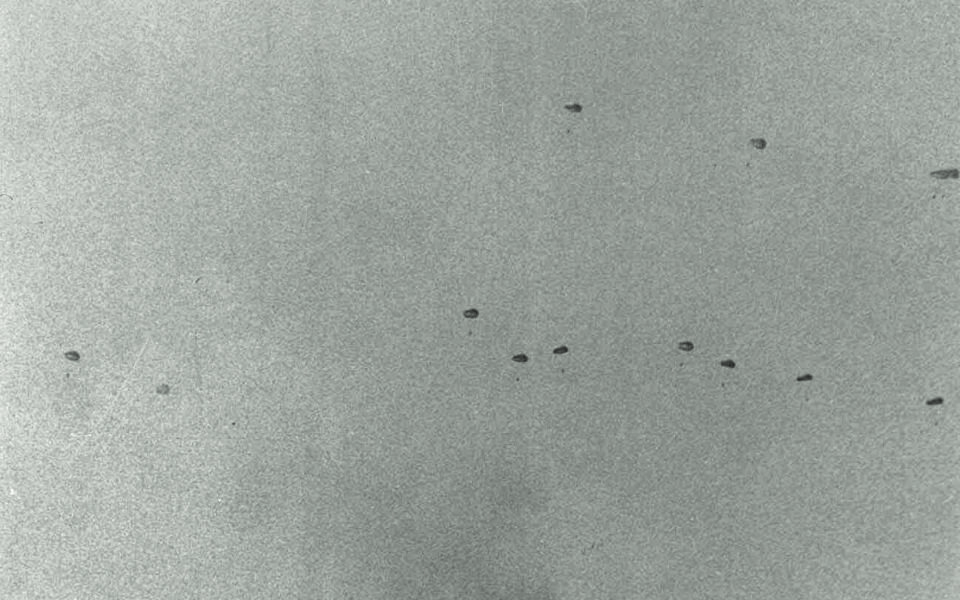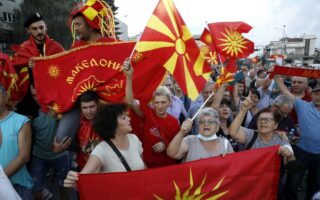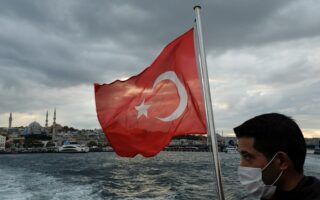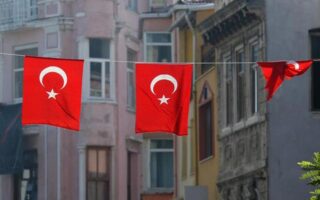The dramatic 38 minutes of a national tragedy
The conversations at the War Council in Athens on July 1974, headed by the ‘invisible dictator’ Dimitrios Ioannidis

The ghosts of 1974 are still very much among us. What would have happened if the views of the “invisible dictator” Dimitrios Ioannidis had prevailed and if, on the morning of July 20, 1974, when the Turkish forces invaded Cyprus, Athens had declared war on Ankara?
You could, in fact, say that the briefing room at the Greek Ministry of National Defense on Mesogeion Avenue where the War Council was held on that day is the “haunted house” of contemporary history, on which, almost half a century later, the executive editor of Kathimerini, Alexis Papachelas, shone a light in his book “A Dark Room.”
A clip of 38 minutes from that day that has survived on tape was recently rediscovered and has all the elements of a tragedy. Those few minutes are an astounding testament that can shake even those readers that are not familiar with the era and its protagonists, to their very core. They convey the emotional charge and drama of those fateful hours, but also the true visage of power when faced with responsibilities of historical proportions.
Many politicians and senior military officers participated in that War Council, including the president of Greece, Phaedon Gizikis, prime minister Adamantios Androutsopoulos, minister of the prime minister’s office Konstantinos Rallis, Dimitrios Ioannidis, and the chief of the armed forces Grigorios Bonanos. Ioannidis towered over the rest and was the man behind the coup against Archbishop Makarios, which triggered the Turkish invasion plans. As a result, the ‘backstage dictator’ that had deposed Georgios Papadopoulos less than a year before, installed Androutsopoulos and was scheming to vindicate the military junta through intervention in Cyprus and its unification with Greece, now found himself at odds with Androutsopoulos, and even General Bonanos.
‘We should call Sampson and tell them to convene the cabinet and declare unification with Greece. We will accept it and war will break out’
At the beginning of the clip, the “main actors” are obviously confused. They are trying to understand whether this was truly an invasion and a casus belli. “On the Greek side, as you can all understand, it is now a matter of deciding war,” says General Bonanos. “Why do they not explicitly state their intentions if they want to divide the island,” Androutsopoulos says later, referring to the Americans.
Bonanos slowly moves the debate away from war and conscription to diplomatic initiatives. “The first step must be to recall our ambassador in Ankara […] At the same time the expected conscription will be done to the required extent.” Ioannidis intervenes: “We are wrong on one point […] I say: Excuse me, we are at war. War has already begun. The answer must be that: Turkey initiated the war and Greece will defend itself and will take appropriate measures to defend the homeland. This is the answer. At a minimum, war.” He also demands that the union of Greece and Cyprus is declared, something that would be the same as the declaration of war he is after. After all, why would Greece go to war if it did not already consider Cyprus its core national territory?
“What they accuse everyone of here, in the events of 1964, is not declaring the union,” says Ioannidis, referring to the conflicts that took place in 1964 on Cyprus. “We must be done with this. There will not be more developments than what has already taken place. Because if we do not declare the union the others will invade […] We should call Sampson and tell them to convene cabinet meeting and declare unification with Greece. We will accept it and war will break out. We shall see what happens from there.” He does not accept that potential offensive moves by Greece could incriminate it in the eyes of the United States and that Greece could be blamed for the crisis. He predicted that “they will in land in Kyrenia. And after they land, they will invade […] The Turks do what they want to do.”
Orders ignored
We will never know what would have transpired if Ioannidis got his way. Concerns were expressed at the War Council that a Greek landing on Cyprus would trigger a Turkish attack on Thrace, an attack by Bulgaria on Greece or even Russian interference in Cyprus.
Androutsopoulos and Bonanos defused the “Ioannidis bomb” after they foiled his plans by not executing the direct order of the dictator to “go to war with Turkey.” How did they manage it? How were they sure that they would not face the vengeance of the brigadier who up until then was omnipotent and unquestioned? Would Greece have won the war and succeeded in the efforts to secure the union or would it lose national territory that would have radically reshaped the map of modern Greece? The debate is revealing and leads to some surprising conclusions. At the end of this 38-minute piece of drama, Ioannidis is heard saying: “It seems the pace of events has overtaken us. All cities in Cyprus are currently being bombed.”
The “din of looming events” was imprinted on the magnetic tape that day. The ghosts of the past, 48 years later, continue to define the present and the future.





